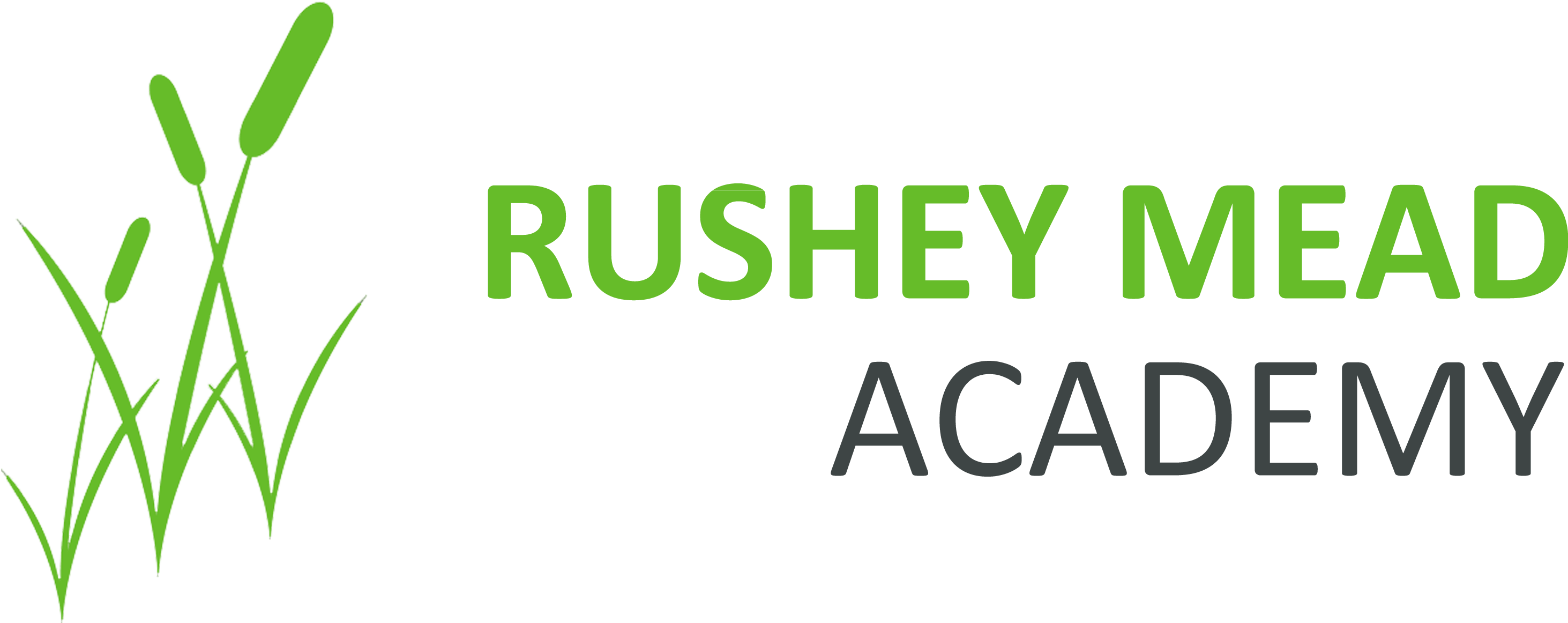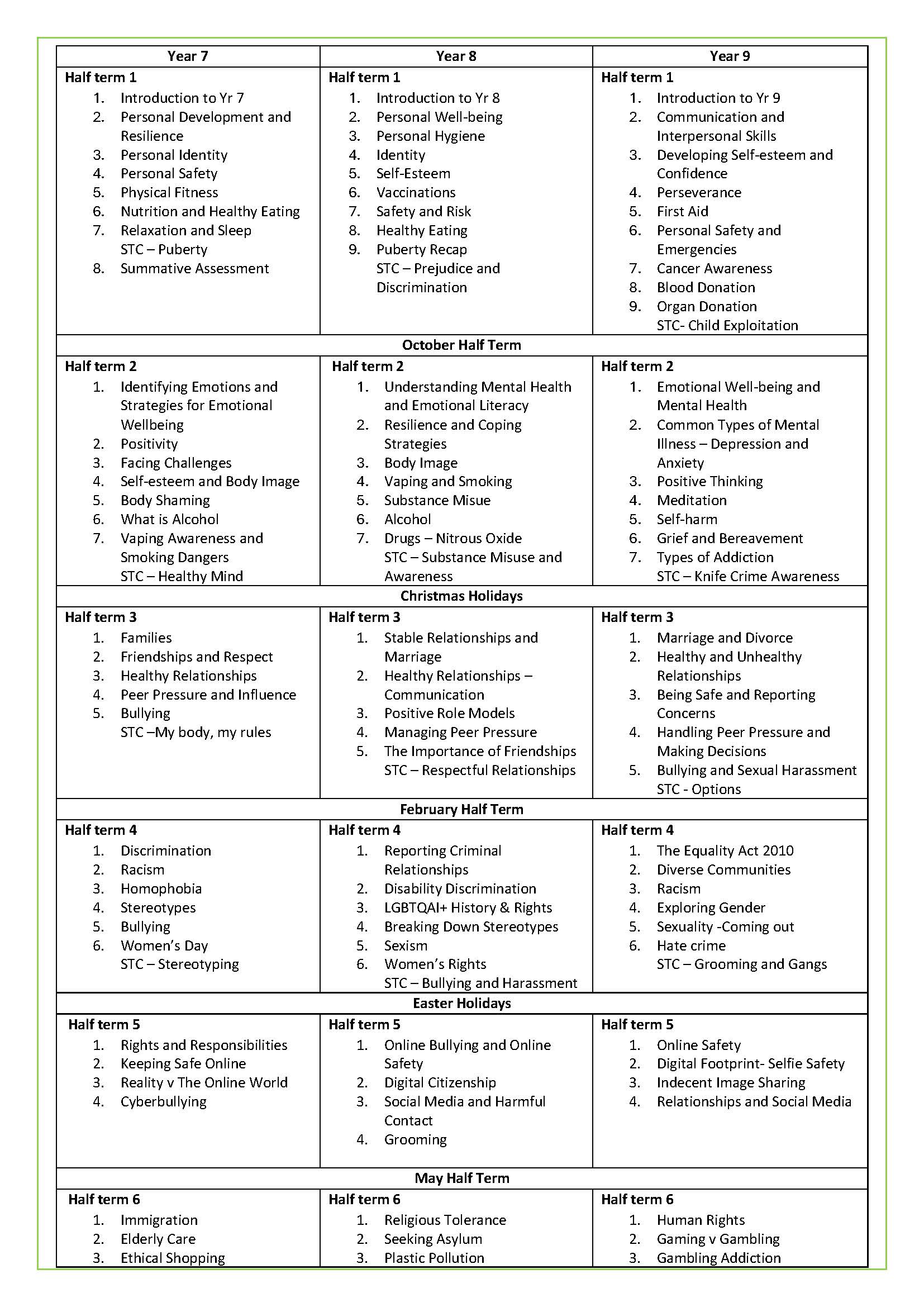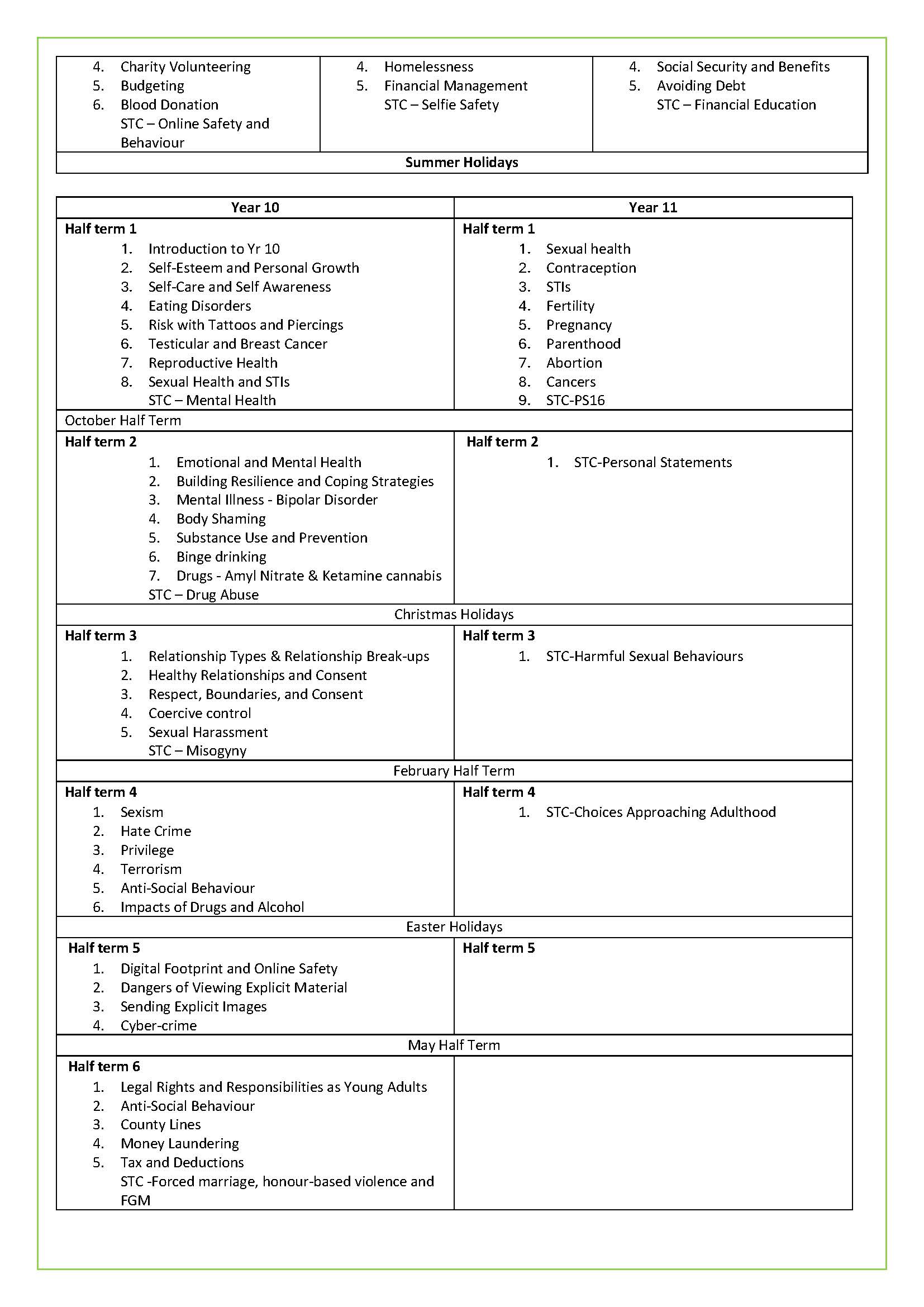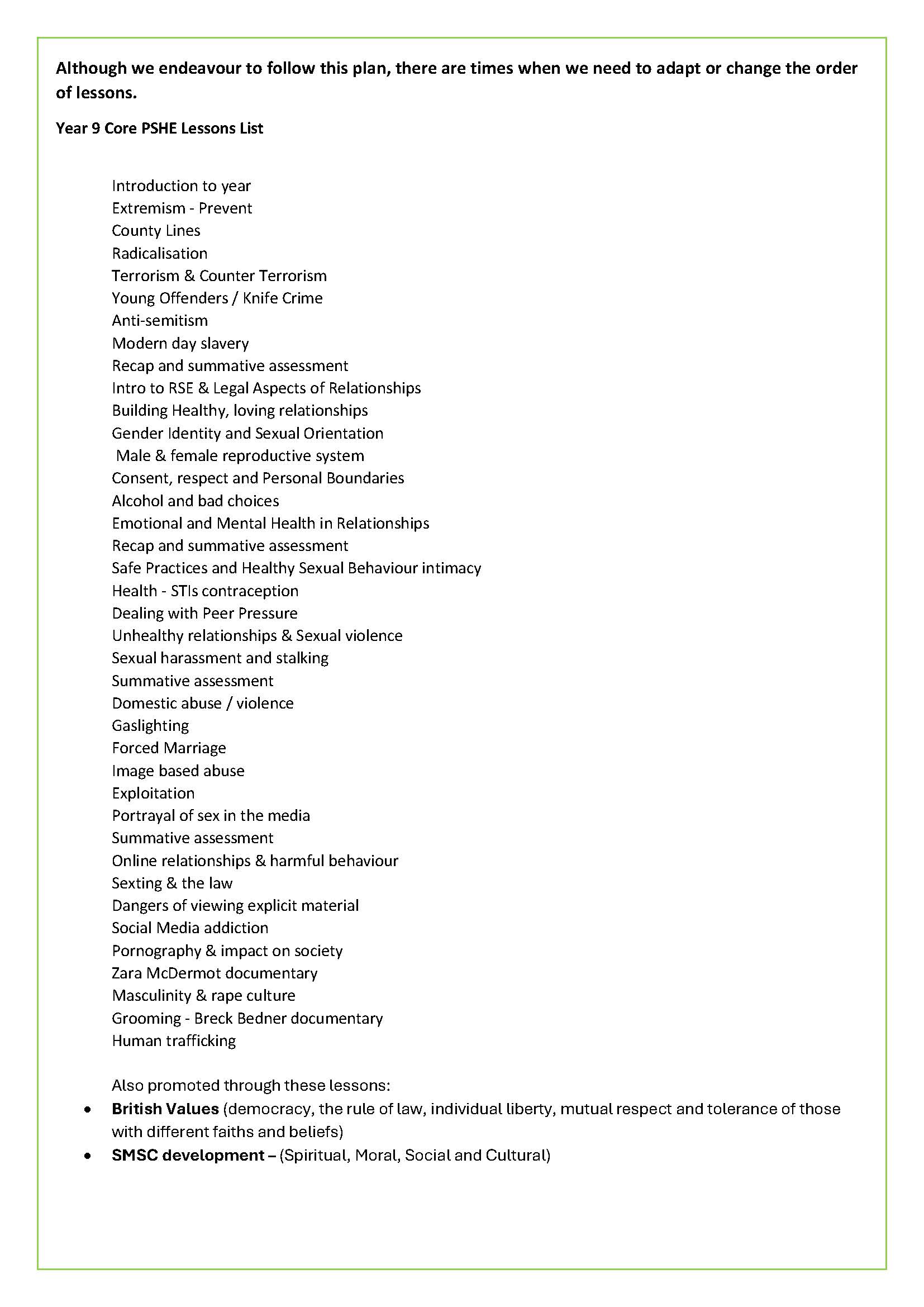Health and Wellbeing & Living In the Wider World
| TOPIC |
BY THE END OF KS4 STUDENTS SHOULD KNOW |
| Mental wellbeing |
• How to talk about their emotions accurately and sensitively, using appropriate vocabulary
• That happiness is linked to being connected to others
• How to recognise the early signs of wellbeing concerns
• Common signs of mental ill health (e.g. anxiety and depression)
• How to critically evaluate when something they do or are involved in has a positive or negative effect on their own or others’ mental health.
• The benefits and importance of physical exercise, time outdoors, community participation and voluntary and service-based activities on mental wellbeing and happiness. |
| Internet safety and harms |
• The similarities and differences between the online world and the physical world, including: the impact of unhealthy or obsessive comparison with others online (including through setting unrealistic expectations for body image), how people may curate a specific image of their life online, over- information is targeted at them and how to be a discerning consumer of information online.
• How to identify harmful behaviours online (including bullying, abuse or harassment) and how to report, or find support, if they have been affected by those behaviours. reliance on online relationships including social media, the risks related to online gambling including the accumulation of debt. |
| Physical health and fitness |
• The positive associations between physical activity and promotion of mental wellbeing, including as an approach to combat stress.
• The characteristics and evidence of what constitutes a healthy lifestyle, maintaining a healthy weight, including the links between an inactive lifestyle and ill health, including cancer and cardio-vascular ill-health.
• About the science relating to blood, organ and stem cell donation. |
| Healthy eating |
• How to maintain healthy eating and the links between a poor diet and health risks, including tooth decay and cancer. |
| Drugs, alcohol and tobacco |
• The facts about legal and illegal drugs and their associated risks, including the link between drug use, and the associated risks, including the link to serious mental health conditions.
• The law relating to the supply and possession of illegal substances.
• The physical and psychological risks associated with alcohol consumption and what constitutes low risk alcohol consumption in adulthood.
• The physical and psychological consequences of addiction, including alcohol dependency.
• Awareness of the dangers of drugs which are prescribed but still present serious health risks.
• The facts about the harms from smoking tobacco (particularly the link to lung cancer), the benefits of quitting and how to access support to do so. |
| Health and prevention |
• About personal hygiene, germs including bacteria, viruses, how they are spread, treatment and prevention of infection, and about antibiotics.
• About dental health and the benefits of good oral hygiene and dental flossing, including healthy eating and regular check-ups at the dentist.
• The benefits of regular self-examination and screening.
• The facts and science relating to immunisation and vaccination.
• The importance of sufficient good quality sleep for good health and how a lack of sleep can affect weight, mood and ability to learn. |
| Basic first Aid |
• Basic treatment for common injuries.
• Life-saving skills, including how to administer CPR
• The purpose of defibrillators and when one might be needed. |
| Changing adolescent body |
• Key facts about puberty, the changing adolescent body and menstrual wellbeing.
• The main changes which take place in males and females, and the implications for emotional and physical health. |
Relationships & Sex Education
| TOPIC |
BY THE END OF KS4 STUDENTS SHOULD KNOW: |
| Families |
• That there are different types of committed, stable relationships
• How these relationships might contribute to human happiness and their importance for bringing up children
• What marriage is, including their legal status, e.g. that marriage carries legal rights and protections not available to couples who are cohabiting or who have married, for example, in an unregistered religious ceremony
• Why marriage is an important relationship choice for many couples and why it must be freely entered into
• The characteristics and legal status of other types of long-term relationships
• The roles and responsibilities of parents with respect to raising of children, including the characteristics of successful parenting
• How to: determine whether other children, adults or sources of information are trustworthy: judge when a family, friend, intimate or other relationship is unsafe (and to recognise this in others’ relationships); and, how to seek help or advice, including reporting concerns about others, if needed |
| Respectful relationships, including friendships |
• The characteristics of positive and healthy friendships (in all contexts, including online) including: trust, respect, honesty, kindness, generosity, boundaries, privacy, consent and the management of conflict, reconciliation and ending relationships. This includes different (non-sexual) types of relationship
• Practical steps they can take in a range of different contexts to improve or support respectful relationships
• How stereotypes, in particular stereotypes based on sex, gender, race, religion, sexual orientation or disability, can cause damage (e.g. how they might normalise non-consensual behaviour or encourage prejudice)
• That in school and in wider society they can expect to be treated with respect by others, and that in turn they should show due respect to others, including people in positions of authority and due tolerance of other people’s beliefs
• About different types of bullying (including cyberbullying), the impact of bullying, responsibilities of bystanders to report bullying and how and where to get help
• That some types of behaviour within relationships are criminal, including violent behaviour and coercive control
• What constitutes sexual harassment and sexual violence and why these are always unacceptable
• The legal rights and responsibilities regarding equality (particularly with reference to the protected characteristics as defined in the Equality Act 2010) and that everyone is unique and equal |
| Online and media |
• Their rights, responsibilities and opportunities online, including that the same expectations of behaviour apply in all contexts, including online
• About online risks, including that any material someone provides to another has the potential to be shared online and the difficulty of removing potentially compromising material placed online
• Not to provide material to others that they would not want shared further and not to share personal material which is sent to them
• What to do and where to get support to report material or manage issues online
• The impact of viewing harmful content
• That specifically sexually explicit material e.g. pornography presents a distorted picture of sexual behaviours, can damage the way people see themselves in relation to others and negatively affect how they behave towards sexual partners
• That sharing and viewing indecent images of children (including those created by children) is a criminal offence which carries severe penalties including jail
• How information and data is generated, collected, shared and used online |
| Being safe |
• The concepts of, and laws relating to, sexual consent, sexual exploitation, abuse, grooming, coercion, harassment, rape, domestic abuse, forced marriage, honour-based violence and FGM, and how these can affect current and future relationships
• How people can actively communicate and recognise consent from others, including sexual consent, and how and when consent can be withdrawn (in all contexts, including online) |
| Intimate and sexual relationships, including sexual health |
• How to recognise the characteristics and positive aspects of healthy one-to-one intimate relationships, which include mutual respect, consent, loyalty, trust, shared interests and outlook, sex and friendship
• That all aspects of health can be affected by choices they make in sex and relationships, positively or negatively, e.g. physical, emotional, mental, sexual and reproductive health and wellbeing
• The facts about reproductive health, including fertility and the potential impact of lifestyle on fertility for men and women
• That there are a range of strategies for identifying and managing sexual pressure, including understanding peer pressure, resisting pressure and not pressurising others
• That they have a choice to delay sex or to enjoy intimacy without sex
• The facts about the full range of contraceptive choices, efficacy and options available
• The facts around pregnancy including miscarriage
• That there are choices in relation to pregnancy (with medically and legally accurate, impartial information on all options, including keeping the baby, adoption, abortion and where to get further help)
• How the different sexually transmitted infections (STIs), including HIV/AIDs, are transmitted, how risk can be reduced through safer sex (including through condom use) and the importance of and facts about testing
• About the prevalence of some STIs, the impact they can have on those who contract them and key facts about treatment
• How the use of alcohol and drugs can lead to risky sexual behaviour
• How to get further advice, including how and where to access confidential sexual and reproductive health advice and treatment |
Questions regarding the PSHE Education curriculum content should be directed to Sarah Harriman, Assistant Principal in the first instance at [email protected]
Parents, carers and students are warmly invited to contribute towards the academy’s PSHE Education approach by completing the Parent Consultation Form
Please note that we welcome contributions at any time and that responses will be reviewed periodically and will inform our approach for the following year.
Parents have the right to withdraw their children from the non-statutory/non-science components/non-health components of sex education within RSE up to and until 3 terms before the child turns 16. After this point, if the child wishes to receive sex education rather than being withdrawn, the school will arrange this. Requests for withdrawal should be put in writing and addressed to the Principal, and can be submitted via email to [email protected]
A copy of withdrawal requests will be placed in the student’s educational record. The Principal will discuss the request with parents and take appropriate action. Alternative work will be given to pupils who are withdrawn from sex education.
Relevant Links
RMA RSE Policy Policies – Page 2 – Rushey Mead Academy | TMET Leicester MAT (rushey-tmet.uk)
Relationships Education, Relationships and Sex Education and Health Education guidance (publishing.service.gov.uk)



